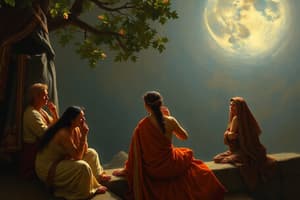Podcast
Questions and Answers
What is the caste system?
What is the caste system?
- The sacred texts of Hinduism.
- A group of rituals performed by Brahmins.
- A philosophy about reincarnation.
- The division of Indian society into groups based on rank, wealth, or occupation. (correct)
What is Hinduism?
What is Hinduism?
The main religion of India; it teaches that everything is part of a universal spirit called Brahman.
What is reincarnation?
What is reincarnation?
A belief that souls are born and reborn many times, each time into a new body.
What is karma?
What is karma?
What is Jainism?
What is Jainism?
What does 'nonviolence' mean?
What does 'nonviolence' mean?
There are four main varnas in Aryan society: the Brahmins, Kshatriyas, Vaisyas, and the __________.
There are four main varnas in Aryan society: the Brahmins, Kshatriyas, Vaisyas, and the __________.
How many castes were there in India at one point?
How many castes were there in India at one point?
What determined membership in a caste?
What determined membership in a caste?
What are the Vedas?
What are the Vedas?
What are the later Vedic texts?
What are the later Vedic texts?
What created the religion called Hinduism?
What created the religion called Hinduism?
Who are the three major gods in Hinduism?
Who are the three major gods in Hinduism?
According to Hindu teachings, what does everyone have inside them?
According to Hindu teachings, what does everyone have inside them?
What is the traditional view of reincarnation in Hinduism?
What is the traditional view of reincarnation in Hinduism?
What principle do Jains follow to avoid eating meat?
What principle do Jains follow to avoid eating meat?
What is the primary reason strict caste rules developed?
What is the primary reason strict caste rules developed?
What does the Rigveda include?
What does the Rigveda include?
Why did sacrifices play a role in Aryan society?
Why did sacrifices play a role in Aryan society?
How did Brahmanism develop into Hinduism?
How did Brahmanism develop into Hinduism?
What are the four main teachings of Jainism?
What are the four main teachings of Jainism?
How did the idea of nonviolence affect the daily lives of Jains in ancient India?
How did the idea of nonviolence affect the daily lives of Jains in ancient India?
What summary can be made about Hinduism and Jainism?
What summary can be made about Hinduism and Jainism?
Flashcards are hidden until you start studying
Study Notes
Origins of Hinduism
- Caste System: A hierarchical social structure in India divided by rank, wealth, or occupation. Higher castes often held more power and privileges.
- Hinduism: The predominant religion of India, emphasizing a universal spirit called Brahman that connects all existence.
- Reincarnation: The cycle of birth and rebirth of souls, a fundamental belief in Hinduism and Buddhism.
- Karma: The principle that actions have consequences on a person's soul, influencing future rebirths.
Jainism and Nonviolence
- Jainism: Established on the teachings of Mahavira, emphasizing the sanctity of all life and strict adherence to nonviolence.
- Nonviolence: A core principle that mandates avoiding harm to any living being, affecting daily practices, especially regarding dietary choices.
The Varnas and Caste Regulations
-
The Varnas: Four primary social groups in Aryan society:
- Brahmins: Priestly class, responsible for religious rituals.
- Kshatriyas: Rulers and warriors, responsible for protection.
- Vaisyas: Farmers, traders, and craftsmen, responsible for producing goods.
- Sudras: Laborers and servants, responsible for serving the above classes.
-
Caste System Evolution: Over time, the four varnas proliferated into approximately 3,000 different castes, further entrenching societal division.
-
Caste Rules: Strict regulations governed interactions between castes, including marriage and dining, with severe penalties for violations leading to ostracism.
Religious Texts and Beliefs
- The Vedas: Sacred texts of Aryan religion with four collections, containing hymns and rituals, including the Rigveda, the oldest, predating 1000 BCE.
- Later Vedic Texts: Comprised Brahmin commentaries on the Vedas, detailing religious rituals and sacrifices.
- Hinduism Development: A synthesis of Vedic teachings with external cultural influences, resulting in the formation of modern Hinduism, the largest religion in India.
Core Hindu Beliefs
- Hindu Gods: A multitude of deities, prominently Brahma (the Creator), Shiva (the Destroyer), and Vishnu (the Preserver).
- Universal Spirit: All deities are considered expressions of the singular universal spirit, Brahman.
- Soul's Goal: The ultimate objective of Hindus is to unite their individual soul (atman) with Brahman, transcending the illusion of the material world.
Relationships between Karma and Caste
- Karma and Rebirth: The concept that one's actions (good or bad) determine their form in future lives, with negative karma resulting in lower social status.
- Caste and Reinforcement: The distinct beliefs and practices of each caste perpetuate a cycle of adherence, making individuals more likely to remain in their designated caste.
Jainism's Reactions to Hinduism
- Dissatisfaction with Hinduism: Groups like the Jains sought alternatives to Hindu beliefs, criticizing the Brahmins' emphasis on rituals.
- Jain Teachings: Core tenets include nonviolence, truthfulness, non-stealing, and renunciation of possessions, which shaped their daily lifestyle.
Summary Insights
- Religion's Evolution: Hinduism emerged from Brahmanical traditions influenced by diverse cultural inputs, while Jainism arose in response to orthodox Hindu practices, advocating for non-attachment and reverence for all life.
Studying That Suits You
Use AI to generate personalized quizzes and flashcards to suit your learning preferences.




